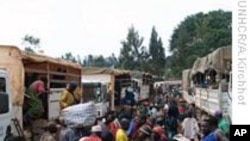The U.N. refugee agency says one of the longest-running refugee sagas
in the world is ending with the return of 400 Burundians who fled to
Tanzania in 1972. The UNHCR has helped 53,500 refugees return to
Burundi from Tanzania since it began its voluntary repatriation
operation in March 2008.
The U.N. refugee agency calls the
return of the last Burundian refugees from Tanzania an important
milestone. The UNHCR says the 400 remaining refugees are departing for
home from Katumba, one of the so-called "Old Settlements' in western
Tanzania.
In a fitting symbolic move, the agency notes the
refugees will travel by train from the same station where they arrived
37 years ago. That was when they fled the eruption of ethnic violence,
which claimed the lives of an estimated 200,000 Burundian civilians.
The
UNHCR says the voluntary repatriation of the 1972 Burundian refugees
was part of a landmark program launched with the Tanzanian government
to end this protracted refugee situation.
U.N. refugee
spokesman, Andrej Mahecic, says 162,000 refugees, who did not wish to
return home, have applied for Tanzanian citizenship.
"In the 37
years, there are many young generations who have been born in
Tanzania," he said. "They do not speak French. They have grown in the
Tanzanian environment and that is why many of them are staying in
Tanzania. In fact, almost three quarters. Those who decided to go
back home have reasons, whether these were the family links or these
were some other reasons, whether it was the issue of land and so on."
Since
August, some 29,000 Burundian refugees have been naturalized. And, the
Tanzanian government says it aims to complete the process by the end of
the year for the remaining 133,000 applicants.
Mahecic says the
UNHCR is helping the refugees who return to Burundi solve problems they
face in reclaiming their land. He says the agency provides them with
temporary shelter and supports the peaceful resolution of land disputes
arising from their long absence.
"All the returnees are also
being provided with packages of aid," said Mahecic. "And, then for
those who decide to return, but have no land to return to, together
with other UN partners, we have been engaged in constructing villages
who are integrated in the existing communities where these people, when
they are brought back, basically they are integrated. We are looking
for ways how to make, if they do not live off the land, what are the
other options in terms of their long-term sustainability."
Tanzania
also hosts Burundian refugees who fled their country in 1993. They
were mainly hosted in refugee camps in Kigoma and Kagera provinces in
the northwest.
Mahecic says all the camps have been closed,
with the exception of one in Mtabila. He says only 36,000 Burundian
refugees remain in that camp. He adds there is an active, separate
repatriation operation going on for this group of people.
News
Last Burundian Refugees Who Fled to Tanzania in 1972 Return Home
update

<!-- IMAGE -->



